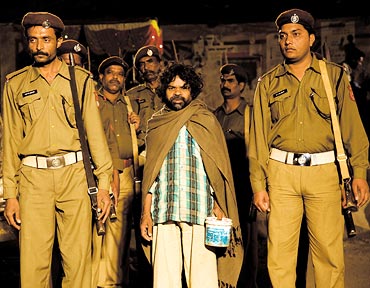
With over 3.5 billion film tickets sold and over 1,000 movies produced annually, India is, undoubtedly, the largest film-consuming market in the world.
It's the reason why, according to FICCI-KPMG's latest estimates, large global studios are showing an increasing interest in co-producing films with Indian film production houses and directors.
Put simply, a film co-production is a broad deal that may apply to any form of co-financing or of financial, creative and technical collaboration involved in the production of a film.
And while the trend may not be new -- Sanjay Leela Bhansali's Saawariya, also the launch-pad of Ranbir Kapoor and Sonam Kapoor, was the first major co-production by Hollywood's Sony Pictures in 2007 -- the momentum is increasing like never before.

Interestingly, 2010 could well be a trend-setter with a number of co-production ventures scheduled to hit the big screen.
Following the box office success of Slumdog Millionaire and My Name Is Khan, Fox Star Studios, for instance, is working with filmmaker Rohan Sippy on his forthcoming Dum Maro Dum.
Starring Abhishek Bachchan and south Indian film star Rana Daggubati, this film is already being touted as one of the winners of 2010.
But what prompted a big Hollywood studio to give the nod to Dum Maro Dum?
"It's a great script, which made us believe in it," reasons Fox Star Studios India's CEO Vijay Singh.

What continues to prompt Hollywood studios to invest in Indian films and ink co-production deals?
Sanjay Ahire, COO, Percept Pictures, says, "Co-production halves the risks involved in making a film."
Yash Chopra, founder of YashRaj Films, India's biggest production house, elaborates: "The concept of revenue generation, over and above box office collections, marked a vital shift in the film entertainment business. Emerging avenues (such as satellite television, Internet movie-viewing and the continuing rise of multiplexes) helped in two ways; firstly in de-risking the business of films, and secondly, by attracting Indian corporates and Hollywood."
While Hollywood studios have been present in India for years as distributors, most are now hoping to grow their pie in markets outside the US, especially in Bollywood.
Will Smith's production company, for instance, is producing two films with UTV, while Reliance Entertainment is a major backer of Steven Spielberg's DreamWorks.
Then there's Crest Animation Studios, a leading animation company in India, which has entered into a co-production deal for a 3D animation film, Norm of the North with the US-based Lionsgate.
Crest Animation Studios, which has already completed another 3D animation film, Alpha and Omega, is the first studio outside the US to have entered into a three-film co-production deal with Lionsgate.

But it's not just Hollywood production houses which are co-producing films. Indian companies, too, are trying co-production deals, mostly with success.
Take PVR Pictures, a wholly-owned subsidiary of PVR, one of the biggest exhibitors in the country. Not satisfied with just exhibiting films, PVR experimented and inked a deal with Aamir Khan Productions for Taare Zameen Par, a film which grossed over Rs 65 crore.
Later, PVR teamed up with Abbas Tyrewalla for Jaane Tu Ya Jaane Na, a mid-range budget film which became one of the biggest hits of 2008. PVR not only exhibited both films but also invested money in them.
Having sensed a lucrative business opportunity, PVR Pictures is set to release 10 films this year, up from the mere four-five films that it co-produced in 2008-09.
Pramod Arora, group president, PVR, is all for "investing with creative partners who believe in their content".

What is leading the company, which specialises in the business of exhibition, to increase stake in co-production ventures?
Adds Arora, "It's a calculated risk but admittedly it is fast becoming a norm in the industry that went through a liquidity crunch last year."
For the record, PVR Pictures is co-producing the Abhishek Bachchan-Deepika Padukone starrer Khelein Hum Jee Jaan Sey with Ashutosh Gowariker.
Then there's the Sonam Kapoor-Abhay Deol starrer Aisha, co-produced by PVR Pictures and Anil Kapoor's production company.
Speaking of Indian companies signing co-production deals, UTV has teamed up with Aamir Khan Productions for Peepli Live, Anusha Rizvi's debut feature.
UTV has already started its international distribution cycle for the film, beginning with the sale of the Poland rights of Peepli Live at the Berlin Film Festival to Vivarto, a Polish distribution company. Peepli Live will have a theatrical release in Poland with 20 prints.
Other co-productions that UTV is working on include Delhi Belly with Aamir Khan Productions, Sanjay Leela Bhansali's Guzaarish and Dharma Productions's I Hate Love Stories.
"We know the 'science' to market a film to global and domestic audiences. That's our core competence," says Siddharth Roy Kapur, CEO of UTV Motion Pictures.

If marketing of films is science, Mahesh Ramanathan, COO of Reliance Big Pictures, believes that "content is king and distribution, god".
This year Reliance Big Pictures has a string of co-productions lined up, including Mani Ratnam's Ravaana and Kunal Kohli's Break Ke Baad.
Ravaana, for instance, will have an elaborate marketing strategy and release in countries like Ghana, Uganda, East and West Africa, besides a larger base in the US, UK and European markets.
As audiences watch some of these big co-productions unfold on the big screen this year, one can only hope that, in the bargain, their cinematic experience, along with the warm tub of popcorn, will get better.